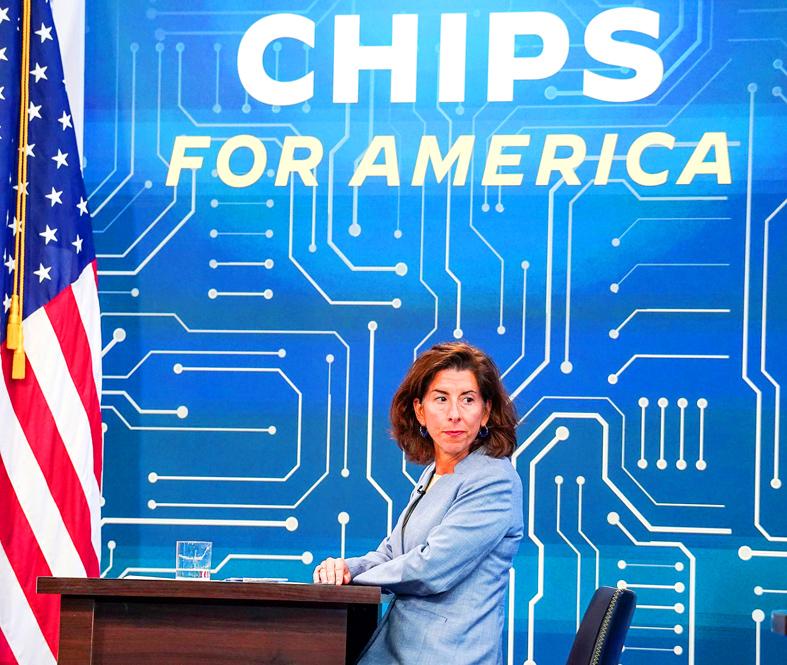The US’ latest ban on advanced electronic design automation (EDA) software exports to China might hinder Chinese chip companies from accessing advanced semiconductor technology, as they attempt to upgrade to 3-nanometer processes in the next three to five years, market researcher TrendForce Corp (集邦科技) said yesterday.
The US Department of Commerce’s Bureau of Industry and Security on Friday announced bans on EDA tools for gate-all-around field-effect transistors (GAAFET), a new-generation semiconductor technology that US chipmaker Intel Corp and Samsung Electronics Co from South Korea are adopting to make 4-nanometer and 3-nanometer chips.
The bureau in a statement said that gate-all-around field-effect transistor structure is key to designing ICs used in military equipment, including defense satellites.

Photo: Bloomberg
Chinese chip designers and foundry service providers lag behind the world’s major chipmakers in developing advanced chips, so the ban of software to design GAAFET technology should not have any substantial effect on them in the short term, the Taipei-based researcher said.
However, “Chinese chip designers will encounter difficulties in designing new-generation chips from the initial design to back-end system design,” TrendForce said in a report.
The world’s top two EDA tool suppliers — Synopsys Inc and Cadence Design Systems Inc, both based in the US — have a combined 62 percent share of the world market, while Siemens EDA, ranked third, has a 13 percent share, TrendForce data showed.
Although Chinese chip designers and foundry companies have already secured a vast amount of EDA software, the companies would still face restrictions from updating those programs for further use in designing chips, the researcher said.
Empyrean Technology Co Ltd (華大九天), China’s biggest EDA software provider, lags far behind its US peers in terms of technology development and revenue scale, TrendForce said.
Empyrean cannot compete with US rivals in digital circuit design EDA, foundry EDA and next-generation GAAFET design software, it said.
The Beijing-based company is good at providing mature EDA technology including analog circuit and flat-panel display circuit design tools, TrendForce said.
The EDA software market is expected to expand at a compound annual growth rate of 13.8 percent to US$13.6 billion from last year to 2024, it said.
The US Bureau of Industry and Security issued an interim final rule that imposes new export controls on four technologies including additional equipment, software and technology used to produce semiconductors.
One of the four technologies is electronic computer-aided design software specially designed for the development of integrated circuits with GAAFET structure, as well as pressure gain combustion technology, the bureau said in a statement posted on its Web site.
Electronic computer-aided design software is a category of tools used for designing, analyzing, optimizing and validating the performance of integrated circuits or printed circuit boards. It is used in a variety of applications by the military and aerospace defense industries for designing complex integrated circuits, the statement said.
GAAFET technology is key to scaling to 3-nanometer and smaller technology nodes, the bureau said.
GAAFET enables faster, more energy efficient and more radiation-tolerant integrated circuits that can advance many commercial and military applications, including defense and communications satellites, it added.

NEW IDENTITY: Known for its software, India has expanded into hardware, with its semiconductor industry growing from US$38bn in 2023 to US$45bn to US$50bn India on Saturday inaugurated its first semiconductor assembly and test facility, a milestone in the government’s push to reduce dependence on foreign chipmakers and stake a claim in a sector dominated by China. Indian Prime Minister Narendra Modi opened US firm Micron Technology Inc’s semiconductor assembly, test and packaging unit in his home state of Gujarat, hailing the “dawn of a new era” for India’s technology ambitions. “When young Indians look back in the future, they will see this decade as the turning point in our tech future,” Modi told the event, which was broadcast on his YouTube channel. The plant would convert

‘SEISMIC SHIFT’: The researcher forecast there would be about 1.1 billion mobile shipments this year, down from 1.26 billion the prior year and erasing years of gains The global smartphone market is expected to contract 12.9 percent this year due to the unprecedented memorychip shortage, marking “a crisis like no other,” researcher International Data Corp (IDC) said. The new forecast, a dramatic revision down from earlier estimates, gives the latest accounting of the ongoing memory crunch that is affecting every corner of the electronics industry. The demand for advanced memory to power artificial intelligence (AI) tasks has drained global supply until well into next year and jeopardizes the business model of many smartphone makers. IDC forecast about 1.1 billion mobile shipments this year, down from 1.26 billion the prior

People stand in a Pokemon store in Tokyo on Thursday. One of the world highest-grossing franchises is celebrated its 30th anniversary yesterday.

Zimbabwe’s ban on raw lithium exports is forcing Chinese miners to rethink their strategy, speeding up plans to process the metal locally instead of shipping it to China’s vast rechargeable battery industry. The country is Africa’s largest lithium producer and has one of the world’s largest reserves, according to the US Geological Survey (USGS). Zimbabwe already banned the export of lithium ore in 2022 and last year announced it would halt exports of lithium concentrates from January next year. However, on Wednesday it imposed the ban with immediate effect, leaving unclear what the lithium mining sector would do in the